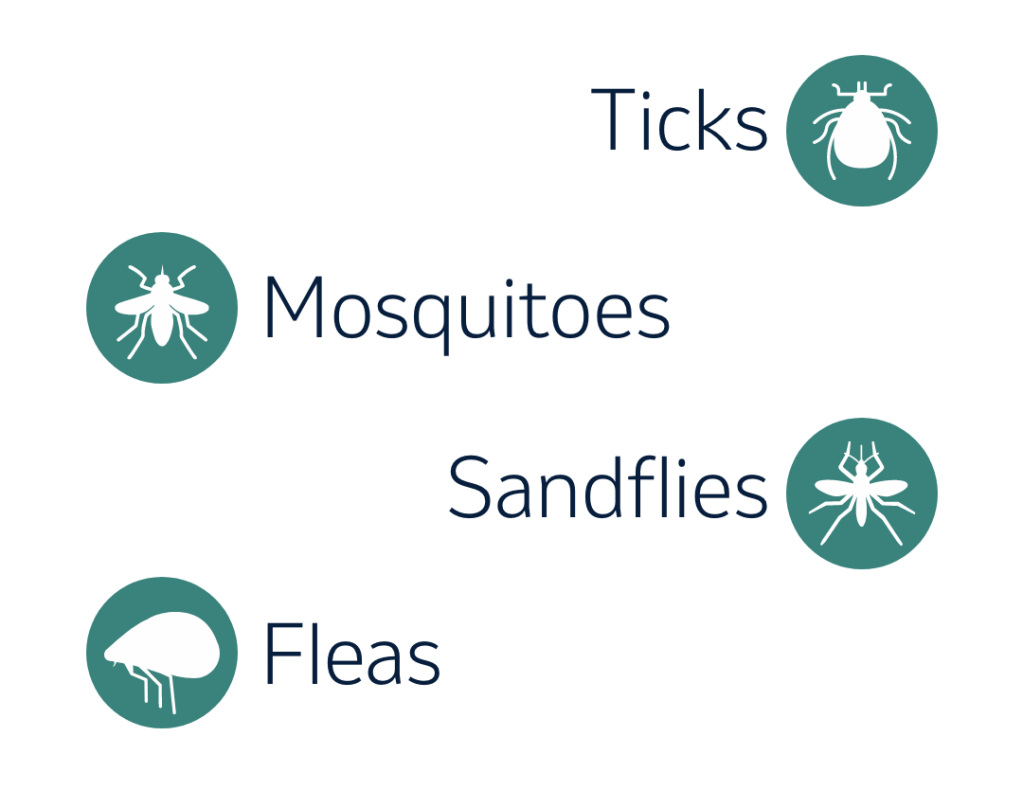The trouble with travel
If a pet travels to an area with parasites that aren’t found in their home country, they risk picking up ‘exotic’ diseases that they aren’t prepared for and could bring parasites back with them on their return journey.
For example, researchers in Germany found that 12.2% of dogs imported from Mediterranean countries or that had travelled there with their owners were positive for leishmaniosis, a dangerous disease transmitted by sandflies which is not supposed to exist in Germany1.
In the UK, 92.3% of all ticks submitted to the Tick Surveillance Scheme came from dogs with a recent history of travel! 44.1% were Brown Dog Ticks, which can transmit a host of diseases to our four-legged friends, including babesiosis2.
As vector expert Laura Kramer:

“OWNERS TRAVELLING WITH THEIR DOGS WITH THEIR CATS GO TO AREAS ENDEMIC TO CERTAIN DISEASES THAT MAY NOT BE PRESENT AT HOME”
A whole host of parasites can target your pet and spread diseases like babesiosis and heartworm. Find out why they’re spreading, and what you can do to keep your dog or cat parasite free.
Many illnesses are spread directly from one person to another, like colds and flu. But others need a means of transport to get to their intended victim, whether that’s you, me, or our pets. This is the case for parasitic diseases.
There are hundreds of different parasites, but some of the most common ones include:

These species vary considerably in their basic structure: for example, mosquitoes are insects, while ticks are arachnids (the same class as the spider). Their ‘mode of attack’ varies too: mosquitoes and sandflies fly to reach their target, while fleas jump and ticks latch onto host animals as they brush past.
What they all have in common, however, is that they serve as vectors for disease. In other words, they transmit infections when they bite their host animal.
To get more information about this crucial concept, check out our informative video entitled “What is a vector” by clicking below.
Why nice weather means fleas on cats and dogs for longer
Changing weather and seasonal shifts are affecting where parasites can be found, and at what time of the year.
Parasites are often tiny and capable of travelling only short distances. But they can travel hundreds of miles in the coats of animals or in human shipments.
Until recently, these species faced a natural barrier: the warm, humid climates they need to thrive could only be found in certain parts of Europe, and at specific times of year.
However now temperatures are rising across Europe. This means the so-called ‘parasite season’ has extended all year-round and many species are able to thrive in areas which would previously have been too cold.
What this means for our pets
For cats and dogs, there are several specific consequences to bear in mind:
- Year-round threat. There is no longer a ‘parasite season’: common threats to companion animals, like fleas in cats or dogs, are now being discovered all year-round.
- Geographic spread. Many parasites that were previously limited to southern Europe, and even further afield, are now being discovered in northerly countries like Holland, Germany and the UK.
- Introduction of exotic species. A parasite that was once considered exotic, like the Tiger mosquito, can now be found in the northern parts of Europe.
This means that parasites have more time to spread diseases, and each European country is having to deal with new species bringing diseases which haven’t been seen there before.
Many pet diseases, such as leishmaniosis, which can cause organ failure in our pets, are now endemic in certain parts of Europe. Others, such as babesiosis, are spreading fast.

Keep your pets safe – wherever they are
If you are travelling with your pet, speak to your vet to make sure your pet is protected against parasites and diseases in your destination. Our free newsletter can help keep you up to date with the spread of parasites and provide you with best-practice scientific information so you can keep your pet out of reach of parasites – whether they’re at home or abroad.
Your vet plays a big role in your pet’s health. Enter your location and get a list of vets near you.
FIND A VET1. Menn, B., Lorentz, S., & Naucke, T. J. (2010). Imported and travelling dogs as carriers of canine vector-borne pathogens in Germany. Parasites & Vectors, 3(1), 1-7. https://doi.org/10.1186/1756-3305-3-34
2. Hansford, K. M., Pietzsch, M. E., Cull, B., Gillingham, E. L., & Medlock, J. M. (2018). Potential risk posed by the importation of ticks into the UK on animals: records from the Tick Surveillance Scheme. Veterinary Record, 182(4), 107-107. https://doi.org/10.1136/vr.10426
















 Go To United States
Go To United States Austria
Austria Belgium
Belgium Czech Republic
Czech Republic Denmark
Denmark Europe
Europe Finland
Finland France
France Germany
Germany Greece
Greece Hungary
Hungary Ireland
Ireland Israel
Israel Italy
Italy Netherlands
Netherlands Norway
Norway Philippines
Philippines Poland
Poland Portugal
Portugal Romania
Romania Saudi Arabia
Saudi Arabia Slovakia
Slovakia South Africa
South Africa Spain
Spain Sweden
Sweden Switzerland
Switzerland Turkey
Turkey United Kingdom
United Kingdom